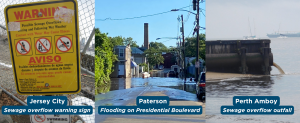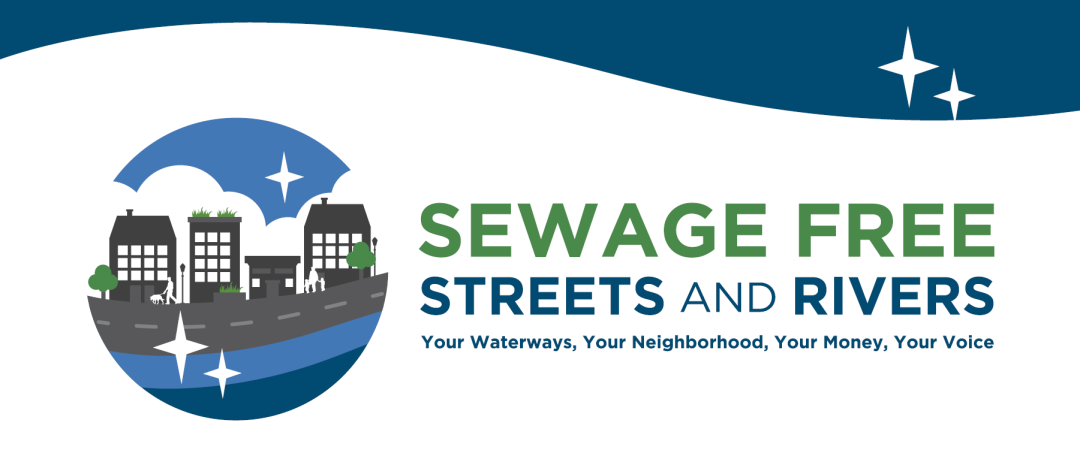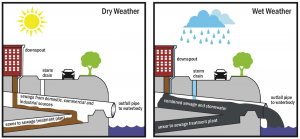FOR IMMEDIATE RELEASE
December 13, 2022
CONTACT:
Michael Atkins
Communications Manager, New Jersey Future
matkins@njfuture.org
609-217-5569
NJDEP Release of Combined Sewer Overflow Permit is a Major Step Towards Eliminating Harmful Sewage Flooding in NJ Communities
Residents urged to participate in the 60-day review process; attend an educational permit review “how-to” workshop
TRENTON, NJ — Combined Sewer Overflows (CSOs) are a clear and present danger to communities across New Jersey, threatening public health and safety during flooding events when sewage can flow into rivers, streams, public streets, and private properties. Last week, the New Jersey Department of Environmental Protection (NJDEP) took a vital first step in addressing the pernicious issue of CSOs by releasing the first in a series of permits containing local strategies to repair sewer systems, and regulate and reduce overflows in impacted communities. New Jersey communities served by combined sewer systems (CSSs) that lead to these overflows are seeking NJDEP approval for projects that will contribute to the ultimate solution of eliminating sewage overflowing into their communities and waterways. This permit release marks a major milestone for New Jersey to meet the goal of sewage-free streets and rivers, and a turning point in our ability to address this issue throughout the state.
Since 2015, NJDEP and community stakeholders have endeavored to address the issue of CSOs dumping sewage into water bodies and backing up into streets and homes by requiring 21 impacted communities to develop Long Term Control Plans (LTCPs) by 2020. These plans will be implemented through a series of five-year permits. The first permit, as announced by NJDEP last week, is for the North Bergen Municipal Utilities Authority—Woodcliff Sewer Treatment Plant and Town of Guttenberg who own separate portions of one connected CSS and discharges overflows into the Hudson River when the capacity of the collection system and/or the sewage treatment plant is exceeded, typically due to heavy rainfall.
CSSs are sewers that were designed many decades ago to collect rainwater and snowmelt runoff, domestic sewage, and industrial wastewater in the same pipe. CSSs are no longer permitted in New Jersey for new communities, but many older cities continue to operate existing CSSs.
Sewage-Free Streets and Rivers and our partners look forward to reviewing this important permit and providing comments to ensure the final permit achieves its intended comprehensive approach to eliminating CSO flooding in an equitable, affordable, transparent way that also reflects individual community priorities and values.
“We are glad the process is underway and thank the NJDEP for shepherding communities who are actively seeking solutions and for ensuring a fair 60 day comment period. We also acknowledge the hard work completed by municipalities, utilities, community members, and community organizations to develop plans over the last seven years. Moving forward, it is critical that NJDEP prioritizes release of the CSO permits impacting environmental justice communities. The burden from further delay in reducing flooding is too high of a cost to residents who are already experiencing many daily pressures,” shares Suzanne Aptman, Sewage-Free Streets and Rivers Program Manager.
NJDEP is providing a 60-day public comment period, ending February 13, 2023, during which community members, officials, and community organizations in the Woodcliff neighborhood of North Bergen and town of Guttenberg are urged to carefully review the permit actions and provide comments to NJDEP to ensure the proposed projects, timelines, and costs are the best solutions for that area.
This is a critical moment for directly impacted residents and for stakeholders in the other 20 CSO communities. Modifications made to this first CSO permit will inform the process, projects, timelines, and costs finalized in the other regional CSO permits expected to be released in 2023. As such, community members, officials, and community organizations in the other NJ CSO communities are encouraged to participate in this permit’s public comment process.
Written comments should be submitted by February 13. Two virtual public hearings for oral comments are scheduled for January 23 from 10:00 a.m. to 12:00 p.m. and again from 6:00–8:00 p.m.
“Getting involved in the 60-day public comment period is critical. The people who live, work and run businesses in these cities will pay for these upgrades and should have a strong role in shaping the plans. Community voices are needed to ensure that the solutions are affordable, keep residents healthy, invest in local jobs, businesses and neighborhoods, and create more green spaces that promote climate resiliency,” said Michele Langa, staff attorney at NY/NJ Baykeeper.
A “How-To” Workshop for the Public
Sewage-Free Streets and Rivers Campaign and the Jersey Water Works CSO Committee will offer workshops and guidance to support community engagement in the CSO permit public comment process. These workshops are free and open to the public, municipal officials, and the press to attend to learn more about the issue.
The first virtual workshop will be on January 18 from 7:00–8:30 p.m. During this workshop we will explain how permits work, what should be included or is missing, and how the public can effectively weigh in by providing written or oral testimony during the public comment window. Feel free to invite fellow community members, municipal officials, and community-based organizations. Sign up here to join the workshop or to receive information that will help you to submit written and oral comments during the comment period process.
The Sewage-Free Streets and Rivers campaign collaborates with residents, community organizations and small business owners to advocate for and shape the solutions that were adopted in their Long Term Control Plan and that will be included in their first five-year permits to reduce localized flooding and the raw sewage dumped into our waterways.
Communities With Combined-Sewer Systems and a CSO permit (list)
Bayonne, City of Camden, East Newark, Elizabeth, Fort Lee, Gloucester City, Guttenberg, Hackensack, Harrison, Hoboken, Jersey City, Kearny, Newark, North Bergen, Paterson, Perth Amboy, Ridgefield Park, Trenton, Union City, Weehawken and West New York.
For further questions or inquiries, please contact Michael Atkins, 609-217-5569 or via email matkins@njfuture.org




